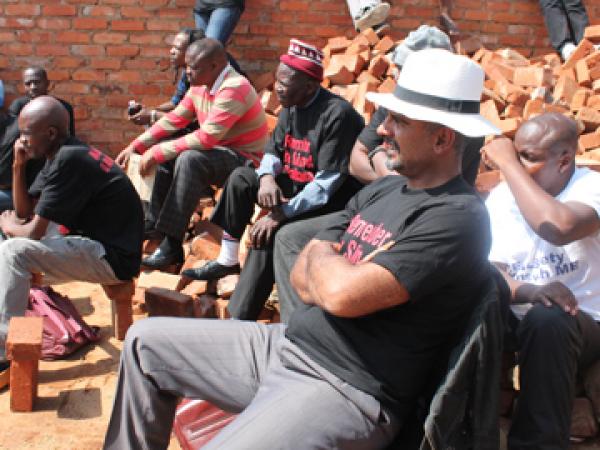

Rehad Desai, director of Miners Shot Down. Photo by Yazeed Kamaldien.
29 May 2014
North West province mineworkers striking for better salaries are lobbying with the power of film to gain support for their cause countrywide.
Three mineworkers who are on strike are currently touring the Western Cape with the film Miners Shot Down.
The film, directed by Rehad Desai and launched this year, informs locals about the fatal killing of Marikana miners on 16 August 2012. Police officers shot dead the miners who had been on strike for a salary increase at the Lonmin mine in the North West.
One of the miners on tour, Jacob Khoza from the Anglo American Platinum mine in Rustenburg, said their aim was to build links across the country.
Khoza and two other mineworkers will show the film in Cape Town and end their tour in the Eastern Cape on 1 June. He said a team of miners was also presently traveling to show the film in Durban.
Khoza is a winch operator at Anglo and he is also a shop steward for Association of Minerals and Construction Union (Amcu) which is leading the strike.
“We are here to get support and to show the people of Cape Town what happened at Marikana. People are getting information that Amcu is not a peaceful union. But we know we are looking only for our money, not for any trouble. We just want a decent wage for workers,” said Khoza.
“We are talking to people and explaining to them what happened in Marikana and what we are fighting for. We are working for peanuts. It’s not enough. We need to support our families.”
Khoza said he earned just under R6,000 a month and their demand – since late 2012 when the strike started – is a monthly salary of R12,500.
“We are still struggling. Our employers said they don’t have the money. We said we would give them four years to address the issue of paying us R12,500 a month,” said Khoza.
“We feel bad that we are the ones taking out the platinum and we are still struggling. We hear that we have 20 years of democracy but we are still suffering while we are working.
“The people who are benefitting are chief executives. They even get bonuses while we are on strike. And all they do is just to take the platinum overseas.”
It has been reported that there are 70,000 workers on strike in North West and Limpopo, with between 150,000 to 200,000 direct dependents. They are from various mines but their demand is the same: a salary increase to R12,500 a month.
Khoza is from the Free State province but moved to the North West to work at a mine. He said he was struggling financially to pay rent for a room in the North West and still send money home to support his family.
A number of civil society initiatives have been set up to assist the miners. Among these is the Cape Town Marikana Support Campaign that is organising a tour of Miners Shot Down screenings and public talks for the miners.
It said in a statement it would grow support for platinum belt miners who have been on strike for 19 consecutive weeks this year.
It said miners were “aware of government’s attempts to delay and manipulate the Farlam Commission (to uncover the events of 16 August) and of management’s failure to honour the wage agreements of 2012.”
“Workers clearly hold unresolved anger. In this bargaining game, they have been persistently lied to, while management has tried underhand tactics to break the strike, fuelling violence and mistrust,” it said.
“As the mineworkers enter their fifth month of strike, the situation on the platinum belt is a humanitarian disaster. While ongoing attempts unfold to reach a settlement to the dispute, the reality on the ground is that children, women and men are facing daily hardships that will persist even after the strike is settled.”
Gift of the Givers has also launched an appeal for support for the striking miners and their families. The humanitarian organisation said that on 24 May it assisted “hungry and starving men, women and children” in North West mining towns.
It said a total “2,300 families received food parcels, 6,000 were fed a hot meal, over a thousand were treated by a 25-member medical team and 300 were given blankets and tinned food in an attempt to give something to everyone of the 10,000 desperate people who turned up” at its public gathering in Marikana.
Imtiaz Sooliman, head of Gift of the Givers, said his team “returned exhausted and satisfied as we witnessed the happiness of a people who were exemplary in conduct satisfied with what little was on offer in the knowledge that someone cared for them and took notice of their plight.”